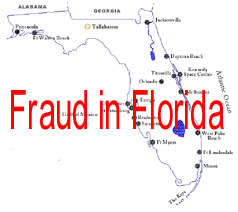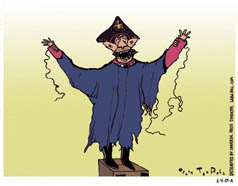The Blowback Begins
From Friday morning's New York Times, page one:
The strategy the veterans devised would ultimately paint John Kerry the war hero as John Kerry the "baby killer" and the fabricator of the events that resulted in his war medals. But on close examination, the accounts of Swift Boat Veterans for Truth' prove to be riddled with inconsistencies. In many cases, material offered as proof by these veterans is undercut by official Navy records and the men's own statements.The New York Times also has a neat graphical depiction of deceit that refutes virtually every verifiable claim made by the Swift Boat Liars.
Several of those now declaring Mr. Kerry "unfit" had lavished praise on him, some as recently as last year.
In an unpublished interview in March 2003 with Mr. Kerry's authorized biographer, Douglas Brinkley, provided by Mr. Brinkley to The New York Times, Roy F. Hoffmann, a retired rear admiral and a leader of the group, allowed that he had disagreed with Mr. Kerry's antiwar positions but said, "I am not going to say anything negative about him." He added, "He's a good man."
In a profile of the candidate that ran in The Boston Globe in June 2003, Mr. Hoffmann approvingly recalled the actions that led to Mr. Kerry's Silver Star: "It took guts, and I admire that."
George Elliott, one of the Vietnam veterans in the group, flew from his home in Delaware to Boston in 1996 to stand up for Mr. Kerry during a tough re-election fight, declaring at a news conference that the action that won Mr. Kerry a Silver Star was "an act of courage." At that same event, Adrian L. Lonsdale, another Vietnam veteran now speaking out against Mr. Kerry, supported him with a statement about the "bravado and courage of the young officers that ran the Swift boats."
"Senator Kerry was no exception," Mr. Lonsdale told the reporters and cameras assembled at the Charlestown Navy Yard. "He was among the finest of those Swift boat drivers."
Those comments echoed the official record. In an evaluation of Mr. Kerry in 1969, Mr. Elliott, who was one of his commanders, ranked him as "not exceeded" in 11 categories, including moral courage, judgment and decisiveness, and "one of the top few" - the second-highest distinction - in the remaining five. In written comments, he called Mr. Kerry "unsurpassed," "beyond reproach" and "the acknowledged leader in his peer group."
From this morning's Washington Post:
In its current TV ad, a Swift boat veteran says, "John Kerry lied to get his Bronze Star. . . . I know, I was there, I saw what happened" -- a reference to the mission on March 13, 1969, when Kerry pulled Lt. Jim Rassmann from a river after an explosion knocked Rassmann off Kerry's boat. The ad says Kerry was not under fire. That episode is also a focus of O'Neill's book.Here's Chris Matthews interviewing Michael Dobbs of the Washington Post on "Hardball":
But The Post reported Thursday that military records of Larry Thurlow, one of Kerry's accusers, show that Kerry's boat faced fire when he pulled Rassmann from the water.
The new 30-second Kerry ad says the Navy documented Kerry's "heroism and awarded him the Bronze Star." In the ad, Rassmann says: "All these Viet Cong were shooting at me. I expected I'd be shot. When he pulled me out of the river, he risked his life to save mine."
MATTHEWS: Michael Dobbs is the “Washington Post” reporter who broke the story today about Larry Thurlow‘s Bronze Star citation. Let‘s talk about that citation. You report on a front page story in “The Washington Post” today, Michael, that the citation for Larry Thurlow, the gentleman we just talked to, his award was—his Bronze Star was earned because of—he was—as well as other things, he was under enemy fire at the time. He denies that again today on the show, and he says not only did he not go under enemy fire when he took the action he did, the brave action he took to save those crewmen on the other swift boat, but that that language in the citation came from John Kerry. Any evidence of that?Meanwhile, Michelle Malkin's outrageous "Hardball" appearance provided grist for both Chris Matthews and Keith Olbermann:
MICHAEL DOBBS, “THE WASHINGTON POST”: There‘s no proof of that at all. It‘s based on his claim and the claim of some other swift boat veterans that it was John Kerry that wrote the after-action report. In fact, Mr. Thurlow was the senior officer in that particular engagement, so it‘s just as possible to suppose that he wrote the action—after-action report as Mr. Kerry. There‘s no evidence from the document itself as to who wrote the report. Also...
MATTHEWS: Is it a fair assumption on the part of Mr. Thurlow that it was John Kerry‘s words because he was the only one that issued a report, or submitted one, that they would have had to get that information about being under constant enemy fire, automatic weapons fire, et cetera, from the person who filed a report, if no one else did?
DOBBS: I think probably the after-action report could have been the work of several different people, each reporting on what their own boat did. I don‘t think that all the language in Mr. Thurlow‘s citation could have come from that after-action report, either. And there were many things that Mr. Thurlow was doing that are mentioned in his citation that John Kerry was not in a position to observe.
MALKIN: Why don‘t people ask him more specific questions about the shrapnel in his leg. They are legitimate questions about whether or not it was a self-inflicted wound.Later in "Hardball" David Gergen bemoaned Bush's habit of slandering the patriotism of his political opponents.
(CROSSTALK)
MATTHEWS: What do you mean by self-inflicted? Are you saying he shot himself on purpose? Is that what you‘re saying?
MALKIN: Did you read the book...
MATTHEWS: I‘m asking a simple question. Are you saying that he shot himself on purpose.
MALKIN: I‘m saying some of these soldiers...
MATTHEWS: And I‘m asking question.
MALKIN: And I‘m answering it.
MATTHEWS: Did he shoot himself on purpose.
MALKIN: Some of the soldiers have made allegations that these were self-inflicted wounds.
MATTHEWS: No one has ever accused him of shooting himself on purpose.
MALKIN: That these were self-inflicted wounds.
MATTHEWS: Your saying there are—he shot himself on purpose, that‘s a criminal act?
MALKIN: I‘m saying that I‘ve read the book and some of the...
(CROSSTALK)
MATTHEWS: I want an answer yes or no, Michelle.
MALKIN: Some of the veterans say...
MATTHEWS: No. No one has every accused him of shooting himself on purpose.
MALKIN: Yes. Some of them say that.
MATTHEWS: Tell me where that...
MALKIN: Self-inflicted wounds—in February, 1969.
MATTHEWS: This is not a show for this kind of talk. Are you accusing him of shooting himself on purpose to avoid combat or to get credit?
MALKIN: I‘m saying that‘s what some of these...
MATTHEWS: Give me a name.
MALKIN: Patrick Runyan (ph) and William Zeldonaz (ph).
MATTHEWS: They said—Patrick Runyan...
MALKIN: These people have...
MATTHEWS: And they said he shot himself on purpose to avoid combat or take credit for a wound?
MALKIN: These people have cast a lot of doubt on whether or not...
MATTHEWS: That‘s cast a lot of doubt. That‘s complete nonsense.
MALKIN: Did you read the section in the book...
MATTHEWS: I want a statement from you on this program, say to me right, that you believe he shot himself to get credit for a purpose of heart.
MALKIN: I‘m not sure. I‘m saying...
MATTHEWS: Why did you say?
MALKIN: I‘m talking about what‘s in the book.
MATTHEWS: What is in the book. Is there—is there a direct accusation in any book you‘ve ever read in your life that says John Kerry ever shot himself on purpose to get credit for a purple heart? On purpose?
MALKIN: On.
MATTHEWS: On purpose? Yes or no, Michelle.
MALKIN: In the February 1969 -- in the February 1969 event.
MATTHEWS: Did he say on it purpose.
MALKIN: There are doubts about whether or not it was intense rifle fire or not. And I wish you would ask these questions of John Kerry instead of me.
MATTHEWS: I have never heard anyone say he shot himself on purpose.
I haven‘t heard you say it.
MALKIN: Have you tried to ask—have you tried ask John Kerry these questions?
MATTHEWS: If he shot himself on purpose. No. I have not asked him that.
MALKIN: Don‘t you wonder?
MATTHEWS: No, I don‘t. It‘s never occurred to me.
Look, thank you Mayor Brown. We‘ll stay with Michelle Malkin.
Still ahead, David Gergen and Dana Milbank on the battle for the White House. We are going to keep things clean on this show. No irresponsible comments are going to be made on the show.
Finally, on "Countdown", Keith Olbermann stated that Malkin "had made a fool of herself" on Matthews' show.




0 Comments:
Post a Comment
<< Home